
General Manager Asks If He Was A Jerk To Fire MLM Employee For Selling Pyramid Scheme Products At Work
On rare and treasured occasions, a manager can be a close friend to his employees, looking out for and protecting them. But even the best manager’s patience can only be pushed so far before it snaps.
The very same happened when a 30 y.o. general manager of a big box retailer fired an employee who was advertising and selling MLM (“multi-level marketing,” referring to pyramid schemes of all sorts) products to customers of the store. He believes he did the right thing, but his employees said that the fired worker was just trying to make a living.
The question remains – was he in the wrong?
More info: Reddit
Selling something of your own while working in retail would probably be considered a conflict of interest
Image credits: Mike Mozart (not the actual image)
A man took it online to find out if he was a jerk for firing an otherwise good employee for advertising and selling MLM products on company time
Image credits: u/MangerialThrowAway
He was conflicted even though he warned the MLM seller to stop 4 times, but coworkers said that he fired someone for “trying to make a living wage”
The poster of this story didn’t really want to have to fire the worker, because she was a hard worker with 3 years of experience.
When she became involved with an MLM scheme, potentially dōTERRA, as commenters surmised, she began advertising and even selling the products to customers of the store.
4 warnings later and with the behavior not stopping, he reached out to the store manager and the MLM seller was let go.
This prompted some discontent from the other employees, saying that she was “just trying to make a living.” At this point, the poster went online to find out what others thought about the situation.
To get a more informed perspective about dealing with MLM coworkers, Bored Panda reached out to Ceara Manchester, also known as Mombie, an accomplished anti-MLM activist and consumer advocate, who hopes to educate the public and empower people to take action against these schemes on their own.
If you’ve got a pyramid scheme-involved coworker, there may come a time when they’ll pitch you the products or some opportunity, Ceara says. In cases like these, your best course of action is to be kind, but direct with your boundaries.
There may be a temptation to support your coworker, but buying from an MLM representative is less supportive than you may think, Mombie clarifies that while MLMs may claim to be a path to financial freedom, most reps are making no money or actually losing it.
“Purchasing from them gives the rep a false sense of hope, ultimately leading to them remaining involved with the scheme longer. The quicker they understand the MLM is not profitable, the more likely they’ll get out.”
If you’re unsure of how to differentiate between an MLM and a side gig, Ceara Manchester says that the main difference is recruitment.
“The business model is unique in that reps can earn from both selling the product and recruiting others to do the same,” Ceara explains.
Image credits: MART PRODUCTION (not the actual image)
Despite the ability to earn from product sales, MLMs have notoriously low retail numbers to non-distributor customers. The reps are the main customers, while recruitment is highly incentivized.
You’ll read on to find that only less than 1% of people actually earn in MLMs, and Ceara says that they do so by amassing large “downlines” of recruits (the concept of “downlines” and “uplines” is also explained below).
And finally, Ceara has some advice for people who have already been trapped in the quicksand of an MLM. According to her, it may be a confusing situation to navigate, as MLMs operate as commercial cults, and reps are often manipulated, with “uplines” using victim blaming, gaslighting, and guilt tripping.
“In the worst cases, bullying and harassment can happen. The best thing you can do is make a clean break.”
Send a resignation letter to corporate, leave groups, group chats, and don’t be afraid to block people if someone crosses your boundaries.
“Remember, it’s not a failure to leave something that is financially insecure and/or psychologically damaging,” Ceara says in closing.
If you’d like to find out more about her, her work and especially how to spot, avoid, and resist MLMs, visit her website and her Facebook page.
We also reached out to The Anti-MLM Coalition, a group of activists who strive to lift the lid on MLMs by informing and educating people from their own run-ins from participating in or interacting with MLMs. You can also find and follow their work on Twitter and Facebook.
When approached by an MLM coworker, do not compliment the product for any quality if you wish to avoid the conversation.
It’s also likely that passive or active solicitation is already prohibited in your office. Simply decline offers to attend faux parties, which are actually recruitment pitches. “No” is a complete sentence to any MLM pitch.
In the case that you want to help the person, the time is nigh if they’ve approached you.
“Be firm, kind and sympathetic – remember as much as they are perpetrating this scheme, they are also victims of this same behavior that drew them deeper and deeper,” The Anti-MLM Coalition explains.
Instead of giving them a barrage of facts, ask questions. What has the product done for you? What have you been trained to say? What kind of success have you had selling the product?
The key is to activate their own critical thinking process, as opposed to following behaviors of fellow MLM members.
Image credits: Annie Schwier (not the actual image)
Wanting to differentiate MLM from a legitimate job, look for the contrasts between the 9-5 restrictions and the “freedom” granted by the side hustle. They may also mention having team meetings, calls after work or weekend seminars. This language is often used to recruit people fed up with the 9-5 grind.
If you’ve got a brochure of the products, look for the “parent” brand image or logo, searching that name and adding “MLM” to the end will likely give you a pretty clear cut answer.
The Coalition also has a master list, updated quarterly with new MLMs and dropouts.
Be skeptical if there is love bombing or endless praise which you can find in Robert Cialdini’s “On Influence.”
“Be especially concerned if there’s an emphasis on your vulnerabilities. MLMs work because they look to offer THE answer to any specific difficulty in your life. This problem is identified and you are trained to attach your belief in the business to fixing that ongoing concern.”
If you’ve gotten in too deep with an MLM, The Coalition also has some good suggestions.
Be straightforward with your MLM leaders, clearly state that this is not what you signed up for and that it could never give what you desired without putting others in harm’s way.
Review your contract with the company, the key part is to release any financial or legal ties with the MLM. Cut ties according to their stated means of withdrawal. If you have problems, report the issue on the Better Business Bureau website and the fraud form on the Federal Trade Commission’s website.
Sell the stock, run sales if you’ve got a lot to get rid of, or just throw it all away if you can afford the loss. Most companies also have inventory return policies and you shouldn’t give in to your uplines manipulating you – you’re not the bad guy in this case.
Don’t be embarrassed about your experience, millions have gotten hooked by MLMs, including smart, business savvy, and educated people. If you get kickback from your upline, either in the form of abuse or love-bombing, block them and delete their messages.
You should also reach out to anti-MLM groups, there are many Facebook groups and podcasts run by survivors sharing their experiences of shaking of MLMs.
Image credits: Anna Tarazevich (not the actual image)
Interestingly enough, Alison Green of Ask A Manager had a similar story from a reader about 4 years ago.
It seems that the situation in that person’s case was far worse, with them being a manager as well, surrounded by many employees, most of whom seem to have been running various side “hustles” and pyramid schemes of their own. They worried that they were being too soft with the employees, as HR policy dictated that they should be fired.
Another interesting takeaway from that story is that the company pays a living wage, with good incentives and bonuses, so the storyteller doesn’t quite believe that people are doing this because they are strapped for cash.
Alison does point out that the storyteller is being too soft and doing everyone a disservice, saying that they should give employees a week or two at most and if nothing changes, they should be let go.
This is even more important if they aren’t just talking about their products with coworkers but pushing them onto regular customers as well, and making them feel uncomfortable.
If you were to google MLMs, interestingly enough, you may get some interesting results from both sides of the barricades – anti-MLM websites, informing readers on how to recognize and avoid them and pro-MLM websites with info on growing your MLM “downlines” and how to keep them close to you.
If you’re wondering, a “downline” is a recruit of an MLM seller, while their “upline” is someone who they are purchasing their goods from. If you’re interested in the language of MLMs and, conversely, the language of cults, which are actually quite similar to each other, I recommend reading Amanda Montell’s book on the topic – Cultish.
But are there ways to recognize people who want to be friends with you only for financial benefit and avoid them? Pure Wow has some tips.
You’ll know these people when they invite you to chat or meet for a coffee and start talking about some random product. Then, they’ll invite you to a “party”, with free samples of that product, which is a common tactic.
A little while later, they’ll be talking about how much money they’re making and that maybe you should give it a shot. Not long after that, you’ll be saddled with hundreds and thousands of dollars of useless products that you’re now responsible for selling, if you want to get your money back.
And if you needed anymore proof that you should avoid these schemes, while they aren’t illegal, a study by the Federal Trade Commission found that above 99% of MLM participants lost money. Stay safe, unless you believe you can end up in that 1%, grifting the rest, I guess.
The story collected 3.5k upvotes, with 370 comments. Amongst the comments, it seems that only a couple people judged the poster to be a jerk, with the overwhelming majority saying that the manager’s actions were justified, especially if the MLM was dōTERRA, a particularly predatory and harmful company, but we can’t be 100% sure on this.
The community pretty unanimously judged that the poster wasn’t a jerk and that she should have just listened to the warnings
Ironic that the reply to your comment is a spam bot advertising a predatory pyramid scheme...
Load More Replies...I mean, I can understand that you'd need to supplement your income from Walmart -- I'm sure her wages after three years were s**t -- but no MLM is going to earn you enough for that. The only people I've ever heard of making any kind of living from one had to devote their lives to it. But Walmart (or any other store) isn't a swap meet. You want to sling your products, you rent a stall with the rest of the masses and do it there.
And those that do make a living at it don't stay at any particular MLM in the long term. They hop between MLM's taking their network with them.
Load More Replies...Ironic that the reply to your comment is a spam bot advertising a predatory pyramid scheme...
Load More Replies...I mean, I can understand that you'd need to supplement your income from Walmart -- I'm sure her wages after three years were s**t -- but no MLM is going to earn you enough for that. The only people I've ever heard of making any kind of living from one had to devote their lives to it. But Walmart (or any other store) isn't a swap meet. You want to sling your products, you rent a stall with the rest of the masses and do it there.
And those that do make a living at it don't stay at any particular MLM in the long term. They hop between MLM's taking their network with them.
Load More Replies...
 Dark Mode
Dark Mode 

 No fees, cancel anytime
No fees, cancel anytime 







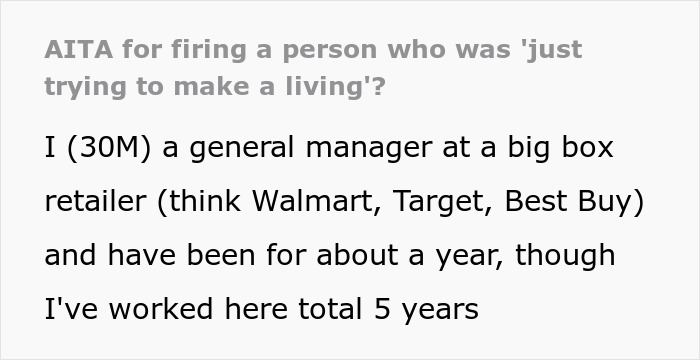
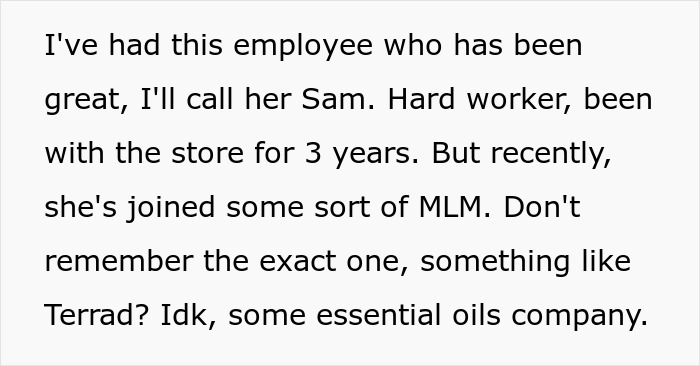
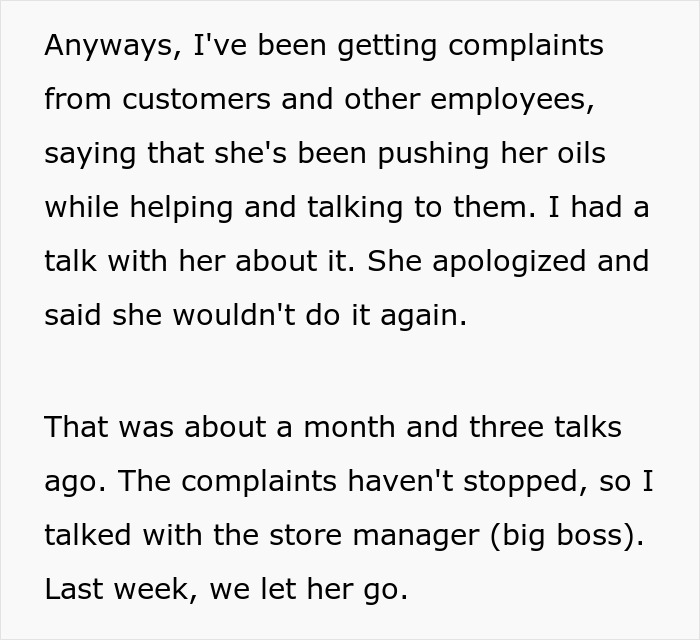





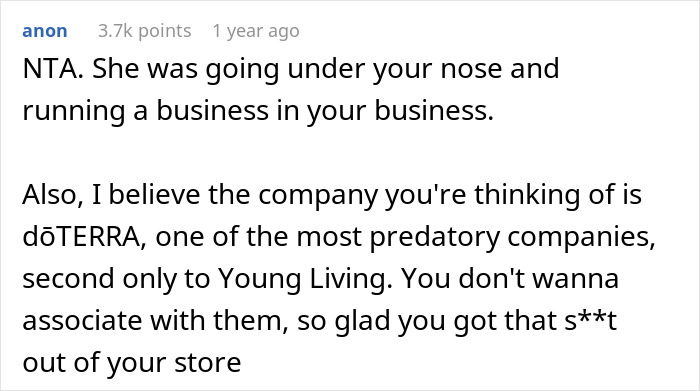


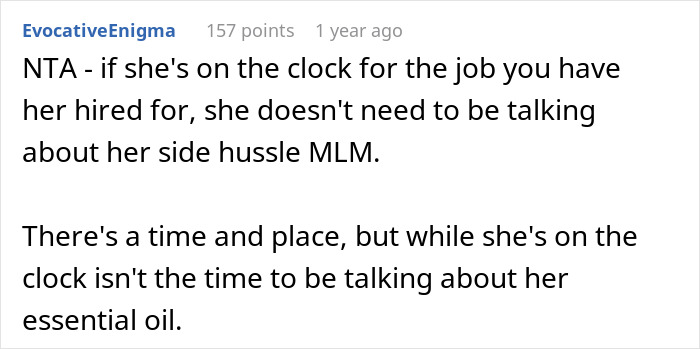



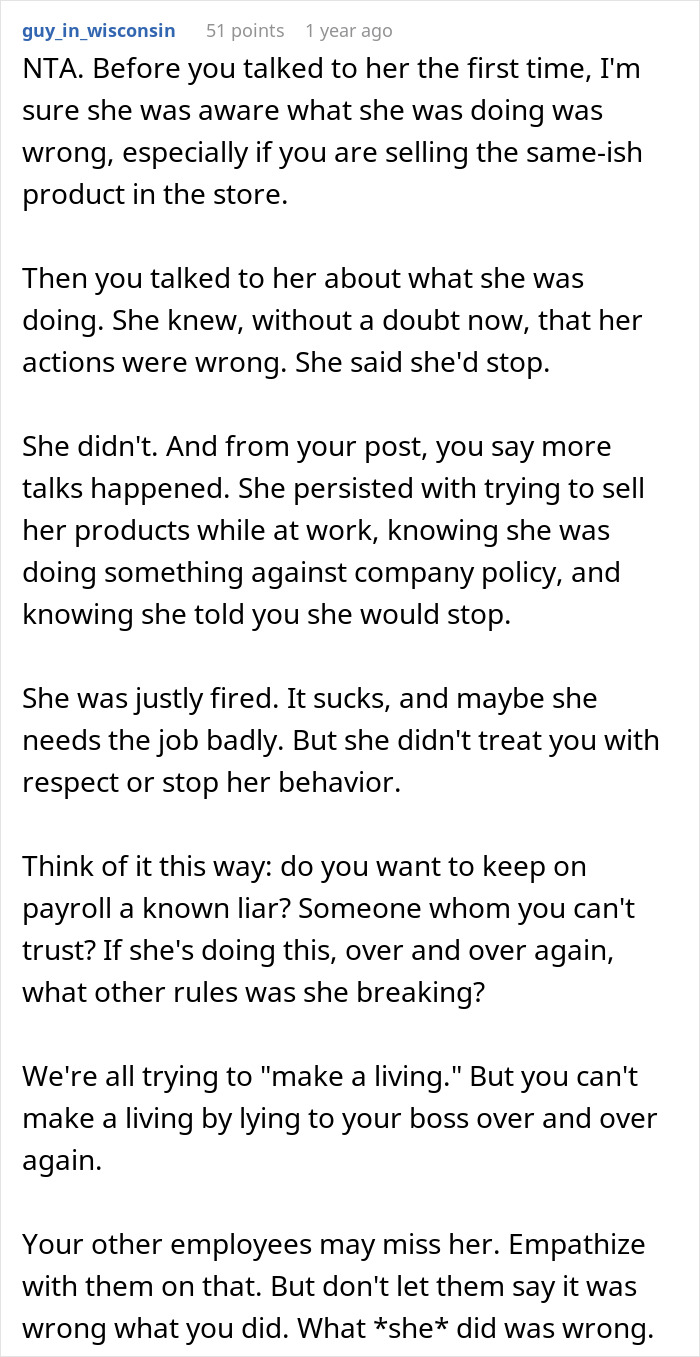

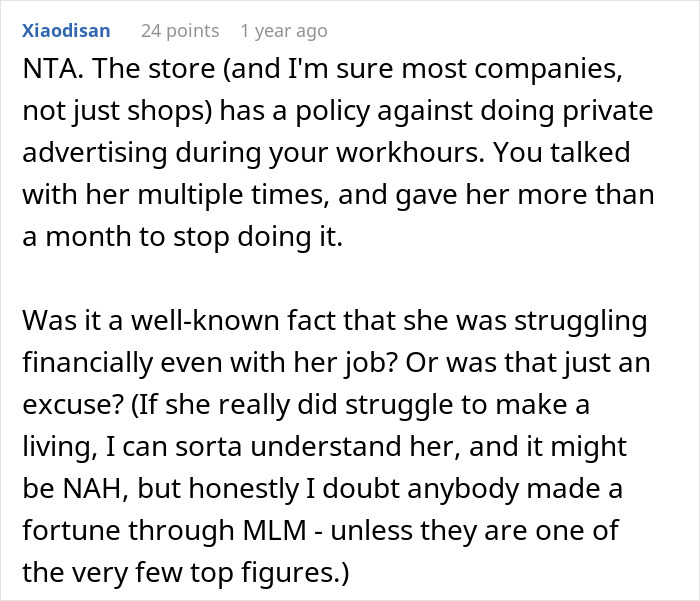













































45
38